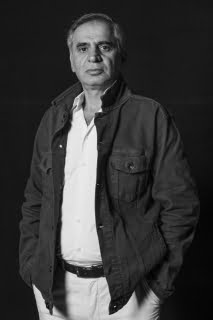
Hussain Al-Mozany
- Iraq
- Zu Gast beim ilb: 2013
Hussain Al-Mozany was born in 1954 in the Iraqi city of Amarah and grew up in Baghdad. He left his country in 1978 for political reasons and went to Lebanon, where he worked as a journalist in Beirut. In 1980 he came to Germany and studied Islamic studies, German literature and journalism at the University of Münster. After conducting research in Cairo he completed his studies with a paper on Egyptian Nobel Prize winner Naguib Mahfouz. He subsequently taught Arabic at a number of different language schools and has worked as a journalist for various Arab and German daily newspapers.
In 1989 Al-Mozany published his first verses in German in an anthology edited by Anja Tuckermann, »In die Flucht geschlagen. Geschichte aus dem bundesdeutschen Asyl« (tr. »Put to flight. Stories of Asylum in West Germany«). He continued to write in Arabic, publishing short stories under the title »Herbst der Städte« (tr. »Autumn in the Cities«) and another edition of short stories under the title »Der Wächter des entrückten Imams« (tr. The guardian of the rapt Imam) as well as the novel »Das Geständnis des Fleischhauers« (tr. »The Butcher’s Confession«). As with many of Al-Mozany’s stories, this too is set between Germany and the Arab world. The first-person narrator, a Halal butcher living in German exile, delivers a lifetime confession, with which he hopes to »shake off an increasing German influence which is gradually becoming sinister«, travels to Egypt where, disillusioned and plagued by hallucinations, he commits murder. Regarding the German language as »the literal home of an uprooted existence«, Al-Mozany decided from then on to produce his literary work in German. His German-language debut came in 1990 with »Der Marschländer. Bagdad, Beirut, Berlin« (tr. »The Man from the Marshlands. Bagdad, Beirut, Berlin«). In it he demonstrated, subtly and with a carefully constructed narrative, the individual overcoming of geographical borders as well as cultural disparities, locating the essence of his writing talent in the literary space which results. In »Mansur oder Der Duft des Abendlandes« (2002; tr. »Mansur, or the Scent of the West«) he tells the story of an Iraqi soldier, coming to Germany to claim his historical rights in this country. The author subtly satirises bureaucratic absurdities and Orientalist clichés of the West.
Along with his literary work, Al-Mozany is a journalist and translator, creating Arabic versions of works by the likes of Ingeborg Bachmann, Gottfried Benn, Günter Grass, Robert Musil, Rainer Maria Rilke, Walter Benjamin, Elias Canetti and Jürgen Habermas. In 2003 he received the Adelbert-von-Chamisso Prize and in 2009 took over the Chamisso Poetry lecturing position at the Technical University, Dresden. The texts in which he reflects on his experiences in exile, his literary identity as well as artistic and ethical questions are collected in »Parallelwelten« (2011; tr. »Parallel Worlds«), complemented by essays.
Der Marschländer
Bagdad, Beirut, Berlin
Glaré
Frankfurt a. M., 1999
Mansur oder Der Duft des Abendlandes
Reclam
Leipzig, 2002
Spiegelschriften
Neue arabische Literatur
Haus der Kulturen der Welt
Berlin, 2003
Das Geständnis des Fleischhauers
Schiller
Berlin/Tübingen, 2007
Parallelwelten
Thelem
Dresden, 2011
